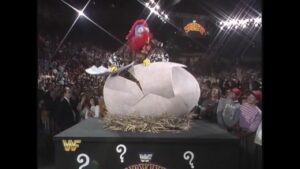With the unveiling of the new WWE Women’s Tag Team Championships on Monday Night Raw, the women’s tag team division in the WWE is now in full effect for the first time since 1989. But online, many fans decried the decision as simply giving into a “women’s agenda”, while others simply thought it would clutter up the WWE with more titles they don’t need. But the women of the WWE only have one title to fight for in each of their respective divisions on Raw and SmackDown, whereas their male counterparts have upwards of four to compete with. And while some may suggest that there aren’t enough teams for a women’s division, there are roughly eight units available to compete cross-brand for these titles, which is more than the Raw and SmackDown tag team divisions have on their exclusive tag divisions. But for those that think WWE is just doing this to push an “agenda”, tag team wrestling for women has been around nearly as long as it has the men, and there have always been championships available for women to compete for. It’s just taken the WWE this long to catch up to the rest of the world (again).
Women’s Tag Team Wrestling: In The Beginning

Tag team wrestling has been around for over 60 years, for both men and women. While documents are unclear when the first tag matches for either gender truly began, there are records of the first champions. The National Wrestling Alliance (NWA) originally allowed tag team wrestling upon its inception in 1948. But it wouldn’t be until 1949 that the first territory would create titles for their tag team competitors. That would be in NWA Los Angeles when the promotion introduced The Dusek Family (Emil & Ernie Dusek) as the territories first World Tag Team Champions. But the women weren’t far behind. While the first women’s NWA World Women’s Tag Team Champions aren’t entirely known, the first known champions were WWE Hall of Famer Mae Young and partner Ella Waldek sometime in 1951.
And while the men’s NWA World Tag Team titles would go through all sorts of distorted lineage (the NWA allowed each territory to have their own “World” Tag Team titles, unlike the unified NWA World’s Heavyweight Champion) until 1982 (when Jim Crockett‘s Mid Atlantic Tag Team titles were the only NWA-affiliated tag titles left becoming the official NWA World Tag Team titles), the NWA World Women’s Tag Team titles remained one straight lineage, until 1984, when the last champions, Velvet McIntyre & Princess Victoria, left the NWA for the WWF, and the title belts were sold to Vince McMahon in the process.
Women’s Tag Team Wrestling: Enter the Joshi

After being essentially blackballed by the NWA due to leaving her husband, influential women’s booker Billy Wolfe, Mildred Burke headed to Japan in 1954, bringing her outlaw women’s promotion, World Women’s Wrestling Association (WWWA) to the country. Burke’s hard-hitting, technical style was absorbed by the women’s wrestlers at the time, just as Rikidozan‘s techniques were creating what would become puroresu for the men. After several companies rose and fell with trial and error following Burke’s model, it was All Japan Women’s Pro-Wrestling (AJW) in 1968 who found the recipe for success. In a tribute to Burke’s influence (who retired from pro wrestling in 1956), AJW named their governing body after Burke’s WWWA, reviving her WWWA World Championship – the famed “Red Belt” – and other titles, including the WWWA World Tag Team Championship.
https://www.youtube.com/watch?v=xkQEhYwed1o
The first WWWA World Tag Team Champions in Japan were crowned on June 30, 1971, with Jumbo Miyamoto and Aiko Kiyo entering the books as inaugural champions. AJW would go on to revolutionize women’s wrestling, not just in Japan but globally, as more and more women from the US, Canada, Mexico and around the world began travelling to work with AJW as women’s wrestling in North America began to become more novelty than actual athletic competition. AJW would close its doors in 2005, with the imposing tandem known as Double Kong (Aja Kong & Awesome Kong) as the final WWWA Tag Team Champions. But AJW’s profound effect in Japanese women’s wrestling – joshi – had left its mark. Today, nearly every single joshi company in Japan continues to have tag team championships, including Stardom (the Goddesses of Stardom titles), Sendai Girls, and many, many more. Unlike the downtime in the United States during the 1990s, women’s tag team wrestling only got better in Japan and continues to be a display of grace and excellence to this day.
https://www.youtube.com/watch?v=GB_ci5MjH5k
Women’s Tag Team Wrestling: The 1990s Decline in North America

In 1983, the WWF signed NWA Women’s World Tag Team Champions Velvet McIntyre & Princess Victoria (much like how they signed NWA Women’s World Champion Fabulous Moolah). While the NWA stripped both of their titles, they were immediately recognized as the inaugural WWF Women’s Tag Team Champions. Several months into their reign as WWF Women’s Tag Team Champions, Princess Victoria suffered a career-ending injury and was replaced by Desiree Petersen. The duo held the titles until the summer of 1985 when they were defeated by the Glamour Girls (Leilani Kai & Judy Martin) who would hold court on the mostly live event circuit for over 900 days.
In 1987, the WWF signed former AJW WWWA Tag Team Champions The Jumping Bomb Angels (Noriyo Tateno & Itsuki Yamazaki), who feuded with the Glamour Girls for the next two years. The Bomb Angels would hold the gold for their own, before a Japanese screwjob (Moolah swerved the titles back onto the Glamour Girls on a tour of Japan unbeknownst to WWF management back in the US) ended their 136-day reign. The Glamour Girls would go on to be the final WWF Women’s Tag Team Champions when the titles were deactivated in February of 1989. It would effectively end women’s tag team wrestling championships in the United States, as the NWA (and then WCW) never activated new titles with the loss of McIntyre & Victoria in 1984, and although Gorgeous Ladies of Wrestling (GLOW) attempted tag team titles of their own, they too were deactivated in 1989.
Women’s Tag Team Wrestling: The US Indie Revolution

In 2005, a small promotion started up in Chicago called SHIMMER Women Athletes (or simply SHIMMER for short), an all-women’s indie promotion that looked to give women a true platform to shine and present women’s wrestling the way Mildred Burke had always intended – and not the way of the Divas of the WWE. In 2008, they started their own SHIMMER Tag Team Championships, and on October 19, 2008, Madison Rayne and Naveah became the first SHIMMER tag champs at SHIMMER Vol. 21. But they weren’t the first women’s tag team champs on the burgeoning US indie scene. In 2006, another new women’s promotion, Women Superstars Uncensored (WSU) started up in New Jersey, and a week prior to the SHIMMER tag team champs being crowned, WSU crowned their own inaugural tag champs, in the Beatdown Betties, featuring Annie Social and Roxie Cotton (indie veteran Gabby Gilbert).
Following the success of SHIMMER and WSU, other women’s promotions began to pop up around the world, with Shine Wrestling crowning their first champs in 2014 (The Lucha Sisters of Mia Yim & Leva Bates) and Queens of Combat (QOC) in 2017 (Chelsea Green & Taeler Hendrix).

Women’s Tag Team Wrestling: The Knockouts

While women’s indie promotions had been pushing the women’s tag team divisions throughout the 2000s, it wasn’t still seen on mainstream national television in the US until TNA/IMPACT Wrestling introduced the TNA Women’s Knockout Tag Team titles, and in September of 2009, the Canadian team of Sarita (Sarah Stock) & Taylor Wilde became the first Knockouts Tag Team champs at TNA No Surrender. The Knockout Tag Team titles would survive for four years, before dying the worst death possible – as part of a gimmick that saw them end up around the waist of a man (Eric Young) in a comedy routine with ODB in 2013.
https://www.youtube.com/watch?v=-lHMPmXeEUo
Women’s Tag Team Wrestling: A Return to the Mainstream

And now, six years after Women’s Tag Team titles were last seen on national television and 30 years after they were last seen in the WWE, they are making their return at Elimination Chamber in February. But don’t think that Women’s tag team wrestling is something new, or something that’s suddenly being added because supporting women is now seen as a “fad” – it’s always been here. It’s only taken the WWE this long to see that it can still work and all it takes it some creativity and willingness on their part to actually portray it as something more than just a prop to hold up an apron or seductively cover a body part. Let’s hope this time they do it right.







